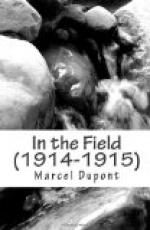In the large yard of the abandoned and pillaged farm, where the men had been billeted they were hurrying to fasten the last buckles and take their places in the ranks. I quickly swallowed my portion of insipid lukewarm coffee, brought me by my orderly; then I went to get my orders from the Captain, who was lodged in the market-square. No word had yet been received from the Colonel, who was quartered at the farm of Vadiville, two kilometres off. Patience! We had been used to these long waits since the army had been pulled up before the formidable line of trenches which the Germans had dug north of Reims. They were certainly most disheartening; but it could not be helped, and it was of no use to complain. I turned and went slowly up the steep footpath that led to my billet.
Pevy is a poor little village, clinging to the last slopes of a line of heights that runs parallel to the road from Reims to Paris. Its houses are huddled together, and seem to be grouped at the foot of the ridges for protection from the north wind. The few alleys which intersect the village climb steeply up the side of the hill. We were obliged to tramp about in the sticky mud of the main road waiting for our orders.
Passing the church, it occurred to me to go and look inside. Since the war had begun we had hardly had any opportunity of going into the village churches we had passed. Some of them were closed because the parish priests had left for the army, or because the village had been abandoned to the enemy. Others had served as marks for the artillery, and now stood in the middle of the villages, ruins loftier and more pitiable than the rest.
The church of Pevy seemed to be clinging to the side of the hill, and was approached by a narrow stairway of greyish stone, climbing up between moss-grown walls. I first passed through the modest little churchyard, with its humble tombs half hidden in the grass, and read some of the simple inscriptions:
“Here lies ... Here lies ... Pray for him....”
The narrow pathway leading to the porch was almost hidden in the turf, and as I walked up it my boots brushed the drops from the grass. The damp seemed to be getting into my bones, for it was still drizzling—a fine persistent drizzle. Behind me the village was in mist; the roofs and the maze of chimney tops were hardly distinguishable.
Passing through a low, dark porch, I opened the heavy door studded with iron nails, and entered the church, and at once experienced a feeling of relaxation, of comfort and repose. How touching the little sanctuary of Pevy seemed to me in its humble simplicity!
Imagine a kind of hall with bare walls, the vault supported by two rows of thick pillars. The narrow Gothic windows hardly allowed the grey light to enter. There were no horrible cheap modern stained windows, but a multitude of small white rectangular leaded panes. All this was simple and worn; but to me it seemed to breathe a noble and touching poetry. And what charmed me above all was that the pale light did not reveal walls covered with the horrible colour-wash we are accustomed to see in most of our village churches.




